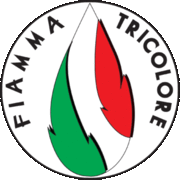Tricolour Flame
Tricolour Flame | |
|---|---|
 | |
| Secretary | Attilio Carelli |
| President | Francesco Condorelli |
| Honorary President | Alessandro Bordoni |
| Founded | 27 January 1995 |
| Preceded by | Italian Social Movement |
| Headquarters | via Roccaporena, 51 - Roma |
| Membership (2005) | 5,000 |
| Ideology |
Italian nationalism Fascism Third Position |
| Political position | Far-right |
| European affiliation | Alliance of European National Movements |
| Website | |
|
www.fiammatricolore.com www.fiammatricolore.org | |
The Social Movement – Tricolour Flame (Italian: Movimento Sociale – Fiamma Tricolore, MS-FT), commonly known as Tricolour Flame (Fiamma Tricolore), is a neo-fascist[1] political party in Italy.
History
The party was started by the more radical members of the Fascist Italian Social Movement, led by Pino Rauti, who refused to join the mainstream conservative party National Alliance. Rauti was later ousted by Luca Romagnoli, who took the leadership.
In the 2004 European Parliamentary Election the party gained enough votes in the Southern constituency to elect Luca Romagnoli to the European Parliament. The party was then a member of the House of Freedoms coalition for the 2006 general election.
In the coming of the 2008 general election, Tricolour Flame formed a joint list called Tricolour Right with The Right of Francesco Storace, a splinter group of National Alliance, in support of the candidacy of Daniela Santanchè for Prime Minister.
Ideology
Tricolour Flame is the party of the Italian far-right most closely tied to the legacy of Italian Social Republic (RSI). The RSI is usually seen by the party as the example of what Fascism should have been, in particular as an example of true welfare state. As a sign of this legacy, the party, for example, guarantees free membership for ex-RSI military.[2] A press release from the Rome section of the party states:
| “ | Tricolour Flame is a movement born just to remark its own ideal proximity to the Social Republic and its fighters. A Republic on which side we would surely have fought, if only the fate would have let us born these years. And we should have surely fought to win, because for us the political synthesis originated from the thought of Benito Mussolini is for us the only political, economical and spiritual system able to bring the freedom and social justice that are today denied to Italians and all other world populations. [...] [We] relaunch our battle for a better tomorrow, embodying the ideals of the Black Shirts of Alessandro Pavolini.[3] | ” |
Tricolour Flame maintains a fairly strong anti-capitalist stance, and it can be thought to be the Italian party closest to third positionist ideology.
Recently Tricolour Flame has been peculiar, among Italian neo-fascist organizations, in actively trying to attract the young masses and renewing its political practices and communication techniques in a more modern, innovative fashion. Political manifests often tend towards attractive, modern graphics and clear-cut, even humorous slogans. Tricolour Flame is also very close to youth far-right organizations and initiatives, of which the most relevant is CasaPound, a social centre in Rome.
The party is against the regionalism promoted by Lega Nord for an independent "Padania", instead favoring a united Italy.
Membership
Among the more controversial members of Tricolur Flame are Pietro Puschiavo and Maurizio Boccacci.[4] In 1985 Puschiavo was a founding member of the Veneto Skinheads Front, a far-right skinhead group based in Veneto and connected to Blood and Honour. Boccacci is the former leader of the Western Political Movement, a far-right skinhead organization based in Rome.[5]
Election results
| Chamber of Deputies | |||||
| Election year | # of overall votes |
% of overall vote |
# of overall seats won |
+/– | Leader |
|---|---|---|---|---|---|
| 1996 | 339,351 (#11) | 0.91 | 0 / 630 |
|
|
| 2001 | 143,963 (#14) | 0.39 | 0 / 630 |
|
|
| 2006 | 230,506 (#15) | 0.60 | 0 / 630 |
|
|
| 2008 | 884,961 (#7) | 2.43 | 0 / 630 |
|
|
| 2013 | 44,753 (#23) | 0.13 | 0 / 630 |
|
|
| Senate of the Republic | |||||
| Election year | # of overall votes |
% of overall vote |
# of overall seats won |
+/– | Leader |
|---|---|---|---|---|---|
| 1996 | 747,487 (#5) | 2.29 | 1 / 315 |
|
|
| 2001 | 340,221 (#7) | 1.00 | 0 / 315 |
|
|
| 2006 | 204,498 (#14) | 0.60 | 0 / 315 |
|
|
| 2008 | 686,926 (#7) | 2.10 | 0 / 315 |
|
|
| 2013 | 52,106 (#20) | 0.17 | 0 / 630 |
|
|
| European Parliament | |||||
| Election year | # of overall votes |
% of overall vote |
# of overall seats won |
+/– | Leader |
|---|---|---|---|---|---|
| 1999 | 496,030 (#15) | 1.60 | 1 / 87 |
|
|
| 2004 | 237,058 (#15) | 0.73 | 1 / 78 |
|
|
| 2009 | 246,403 (#10) | 0.80 | 0 / 72 |
|
|
| 2014 | did not run | |
0 / 72 |
|
|
Leadership
- Secretary: Pino Rauti (1995–2002), Luca Romagnoli (2002–2013), Attilio Carelli (2013–present)
- President: Romolo Sabatini (1995–2000), Stelvio Dal Piaz (2000–2002), Pino Rauti (2002–2004), Rocco Tauro (2004–2013), Attilio Carelli (2013–2014), Francesco Condorelli (2014–present)
- Honorary President: Manlio Sargenti (1995–2001), Alessandro Bordoni (2013–present)
See also
References
- ↑ Maurizio Cotta; Luca Verzichelli (2007). Political Institutions in Italy. Oxford University Press. pp. 40–. ISBN 978-0-19-928470-2. Retrieved 16 July 2013.
- ↑ :: Fiamma Tricolore :: Sito ufficiale :: Appuntamenti
- ↑ Fiamma Tricolore Roma
- ↑
- ↑ Stephen Roth Institute: Antisemitism And Racism